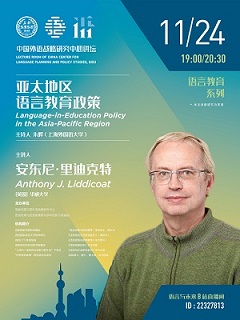
This presentation will examine general patterns in language-in-education policy in the Asia-Pacific region with a focus on official government policies on languages and their use in education. In the presentation, the Asia-Pacific region has been operationalised by combining two regional groupings of nations, the ASEAN + 3 forum and the Pacific Islands Forum. The chapter will begin by considering three main areas of language-in-education policy that are of particular significance for understanding the region. These are 1) the focus on national languages and policies relating to medium of instruction, 2) the teaching and learning of additional languages as second or foreign languages, and 3) the place of minority languages. The language-in-education policies of the Asia-Pacific region collectively reveal a context in which education is normally focused on the learning of two languages – the national language and English, although more monolingual policies in which English is the official language are also found in the Pacific. Literacy development in the official language(s) of nations has been an important part of nation building work of governments in the region, both for developing human capital and also for creating national identity, especially in nations where a local language has been chosen as the official language. Literacy development in the Asia-Pacific region has therefore often been a main means for developing linguistic uniformity in multilingual nations and this has consequences for how other local languages are positioned in education and in the wider society. English has a significant role in the region either a medium of instruction, either alone or together with a local language or, where it is not a medium of instruction, as an additional language with a strongly entrenched place in the curriculum. Local minority languages are often not seen as legitimate targets for learning in national education systems.
Anthony J. Liddicoat
Anthony J. Liddicoat is Professor in the Department of Applied Linguistics at the University of Warwick and Adjunct Professor in Justice and Society at the University of South Australia. His research interests include issues relating to the teaching and learning of intercultural capabilities in language education and language policy and planning and he has published widely in each of these areas. He is currently the Executive Editor of Current Issues in Language Planning and Co-editor of the book series Language and Intercultural Communication in Education (Multilingual Matters). His recent books include Teaching and learning second language pragmatics for intercultural understanding (2022, Routledge, with Troy McConachy), Introduction to conversation analysis (2021, Bloomsbury), Routledge international handbook of language education policy in Asia (2019, Routledge) Language policy and planning in universities: Teaching, research and administration (2017, Routledge).
新闻报道

